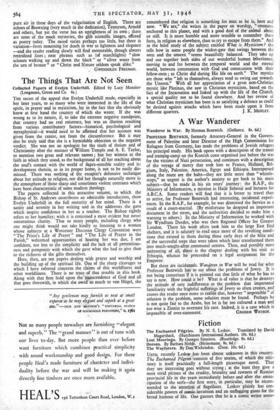A War Wanderer
Wanderer in War. By Norman Bentwich. (Gollancz. 8s. 6d.)
PROFESSOR BEastrwicx, formerly Attorney-General in the Govern- ment of Palestine and later Director of the High Commission for Refugees from Germany, has made the problems of Jewish refugees his principal study. His book opens with a description of the transit and training-camp on the Kentish coast organised just before the War for the victims of Nazi persecution, and continues with a description of the voyage of mercy that took him to France, Holland, Bel- gium, Italy, Palestine, America, Egypt and Ethiopia. Interspersed along the route are the halts—they are little more than "whistle- stops," so urgent is the author's anxiety to get back to his main subject—that he made in his six years' journey: the R.A.F., the Ministry of Information, a mission to Haile Selassie and lectures for A.B.C.A. Some readers will find that it is better to travel than to arrive, for Professor Bentwich had interesting, incidental experi- ences. In the R.A.F., for example, he was dismissed the Service as a result of a court-martial. (By misfortune he dropped an important document in the street, and the authorities decided to make him a warning to others.) In the Ministry of Information he worked with Sir Wyndham Deedes, who was then Regional Officer for Greater London. There his work often took him to the large East End shelters, and it is salutary to read once more of the revolting condi- tions that existed in them during those early days of the blitz and of the successful steps that were taken which later transformed them into much-sought-after. communal centres. Then, and possibly most interesting of all, there is the chapter dealing with his visit to Ethiopia, whence he proceeded on a legal assignment for the Emperor. But these are incidentals. Wanderer_ in War will be read for what Professor Bentwich has to say about the problems of Jewry. It is not being censorious if it is pointed out that little of what he has to say is new. How could it be? What is Of value is that he destroys the attitude of easy indifference, to the problem that impersonal familiarity with the frightful sufferings of Jewry so often creates, and causes the reader once more to realise that, however "impossible" " of solution is the problem, some solution must be found. Perhaps he is not quite fair to the Arabs, but he is far too cultured a man and too wise a Zionist to overstate his case. Indeed, it is a case which is






























 Previous page
Previous page